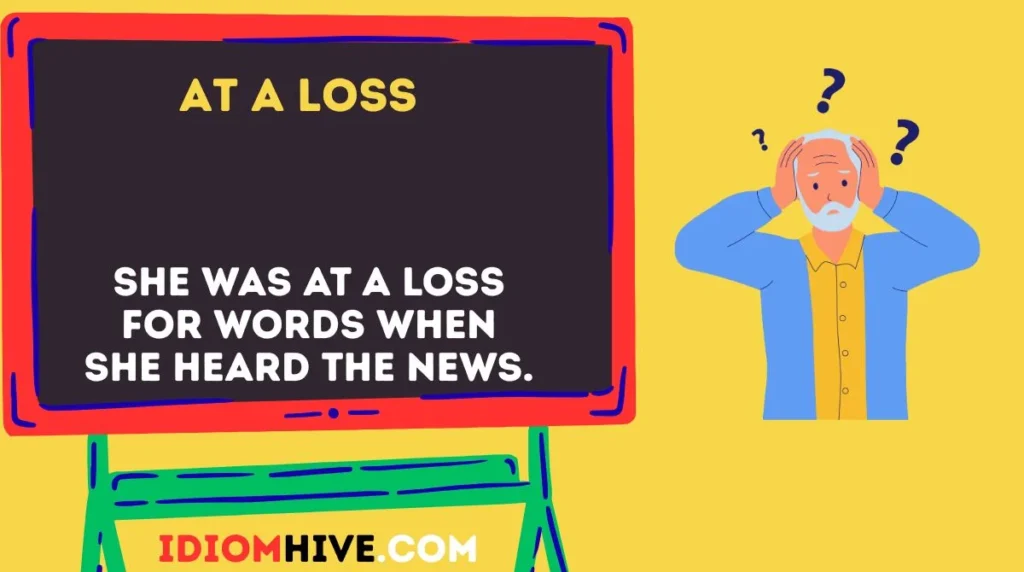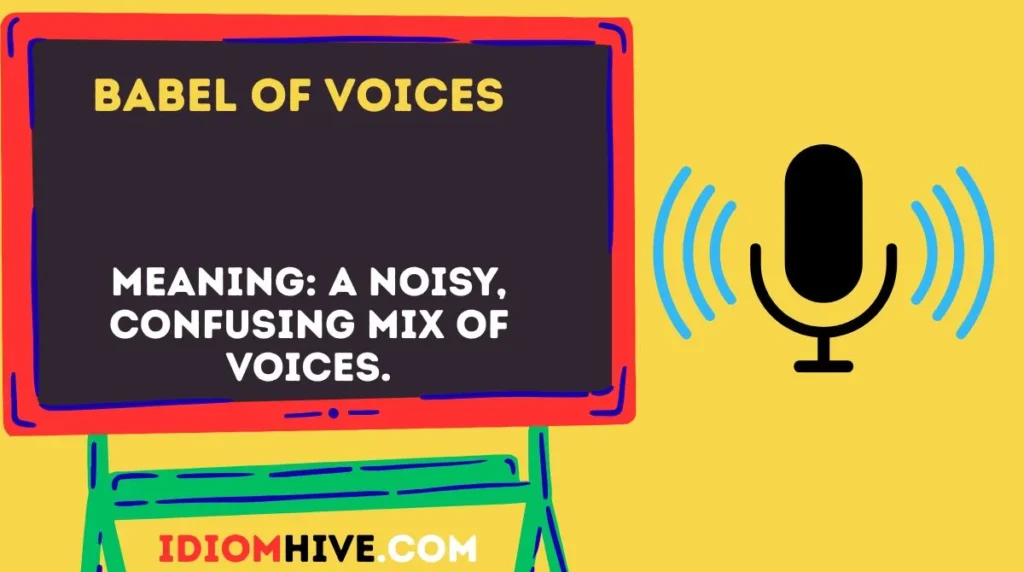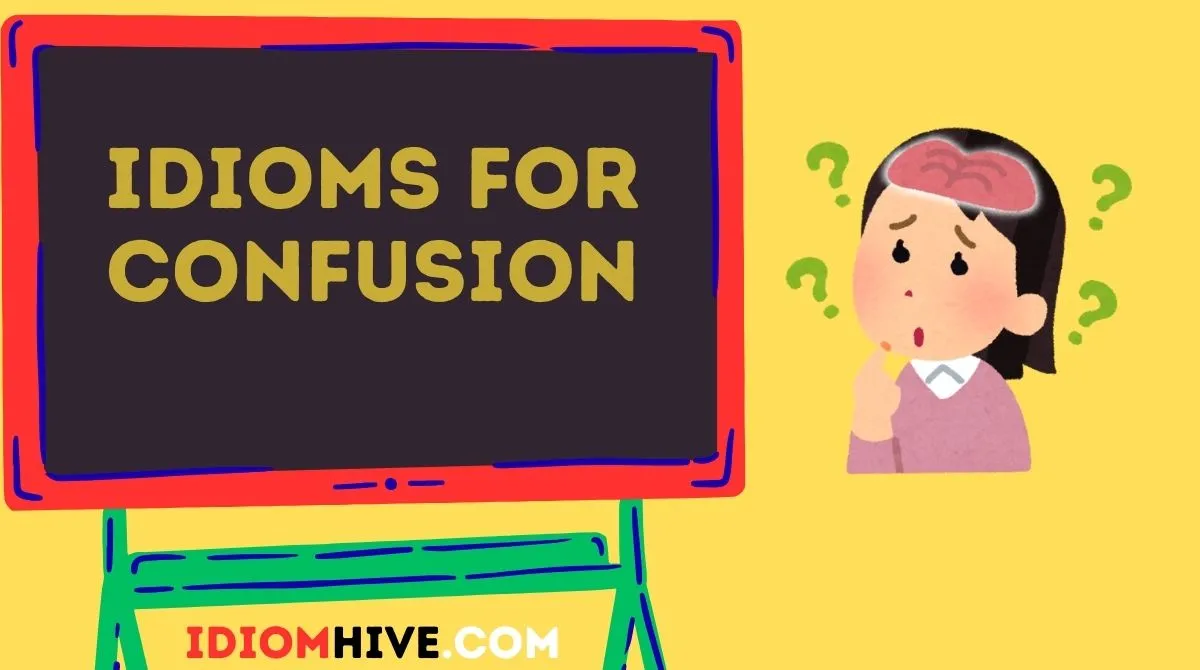Language is more than just words; it’s a collection of expressions, cultural insights, and colorful ways to describe our thoughts and feelings. Idioms are one of the most powerful tools in English communication.
They are short phrases that carry meanings beyond their literal words. For learners, idioms help unlock the natural flow of English, making conversations more engaging and expressive.
Among the many themes, idioms for confusion are especially useful. Why? Because confusion is something everyone experiences—whether you’re stuck in a tricky situation, puzzled by a problem, or lost in someone’s complicated explanation.
Instead of saying “I don’t understand,” idioms give you creative and natural-sounding alternatives. From casual chats to professional discussions, these expressions help you describe puzzlement in a lively and relatable way.
Let’s explore a collection of idioms for confusion, their meanings, examples, and where to use them.
Did You Know?
Many confusion-related idioms in English come from old traditions, sea voyages, and even military slang. For example, “all at sea” originally described sailors lost without direction. Today, it’s a common way to say someone is puzzled or unsure.
Idioms Describing General Confusion
All at sea
Meaning: Feeling lost or puzzled.
Example: I’m all at sea with these new tax rules.
Alternative: At a loss.
Note: Often used in daily life to show you don’t understand something.
In a fog
Meaning: Mentally unclear or confused.
Example: I was in a fog after staying up all night studying.
Alternative: In a haze.
Note: Common in informal speech.
Mixed up
Meaning: Feeling disorganized or confused.
Example: I got mixed up with the meeting times.
Alternative: Jumbled.
Note: Often used for small misunderstandings.
At a loss

Meaning: Unsure what to do or say.
Example: She was at a loss for words when she heard the news.
Alternative: Stuck.
Note: Can be used in both formal and informal situations.
Not have a clue
Meaning: Completely unaware or confused.
Example: I don’t have a clue how this machine works.
Alternative: No idea.
Note: Casual and conversational.
Throw someone for a loop
Meaning: To surprise or confuse someone.
Example: The sudden change in plans threw me for a loop.
Alternative: Catch off guard.
Note: Mostly informal.
Beyond me
Meaning: Too difficult to understand.
Example: Quantum physics is beyond me.
Alternative: Over my head.
Note: Often used humorously in daily life.
Can’t make head or tail of it
Meaning: Unable to understand at all.
Example: I can’t make head or tail of this handwriting.
Alternative: Doesn’t make sense.
Note: British origin, still popular worldwide.
Out of one’s depth
Meaning: In a situation that’s too difficult.
Example: He felt out of his depth in the advanced class.
Alternative: In over one’s head.
Note: Common in professional or academic settings.
Idioms Showing Mental Puzzlement
Mind-boggling
Meaning: Extremely confusing or hard to believe.
Example: The complexity of the puzzle was mind-boggling.
Alternative: Bewildering.
Note: Used in casual and descriptive writing.
Racking one’s brains
Meaning: Trying very hard to remember or solve something.
Example: I was racking my brains to recall her name.
Alternative: Struggling to remember.
Note: Common in both writing and speech.
Scratching one’s head
Meaning: Being puzzled or confused.
Example: The math problem left everyone scratching their heads.
Alternative: Perplexed.
Note: Informal and visual expression.
Up in the air
Meaning: Uncertain or undecided.
Example: Our holiday plans are still up in the air.
Alternative: Not settled.
Note: Often used for unclear situations.
Lost in thought
Meaning: Deeply thinking, sometimes confused.
Example: She was lost in thought and didn’t hear me.
Alternative: Daydreaming.
Note: Can show either confusion or deep reflection.
Cloud one’s judgment
Meaning: To confuse someone’s ability to think clearly.
Example: His anger clouded his judgment during the meeting.
Alternative: Blind judgment.
Note: Often used in serious or formal discussions.
Like a deer in headlights
Meaning: Shocked and frozen, not knowing what to do.
Example: He looked like a deer in headlights when asked a tough question.
Alternative: Speechless.
Note: Very visual, often informal.
Over one’s head
Meaning: Too difficult to understand.
Example: The lecture went completely over my head.
Alternative: Beyond me.
Note: Popular in both spoken and written English.
Idioms for Messy Situations
A tangled web
Meaning: A complicated and confusing situation.
Example: She got caught in a tangled web of lies.
Alternative: Complicated mess.
Note: Common in storytelling.
In a pickle
Meaning: In a confusing or tricky problem.
Example: I’m in a pickle because I forgot my passport.
Alternative: In a jam.
Note: Informal, lighthearted tone.
Between a rock and a hard place
Meaning: Stuck between two difficult choices.
Example: He was between a rock and a hard place, having to choose either job or family.
Alternative: No-win situation.
Note: Serious but commonly used.
Out of whack
Meaning: Not working properly, confusing.
Example: My schedule is out of whack after the holidays.
Alternative: Out of order.
Note: Casual, American usage.
In knots
Meaning: Anxious, confused, or emotionally tangled.
Example: I was in knots waiting for the exam results.
Alternative: Tied up inside.
Note: Emotional and expressive phrase.
Murky waters
Meaning: Complicated or unclear situation.
Example: The deal took us into murky waters legally.
Alternative: Gray area.
Note: Often used formally or professionally.
Wild goose chase
Meaning: A pointless or confusing search.
Example: Looking for that file turned into a wild goose chase.
Alternative: Futile hunt.
Note: Popular idiom in storytelling.
Round in circles
Meaning: Wasting time without solving a problem.
Example: We’re going round in circles with this argument.
Alternative: Spinning wheels.
Note: Casual and practical usage.
A maze of something
Meaning: Something very confusing to go through.
Example: The tax laws are a maze of rules and exceptions.
Alternative: Labyrinth.
Note: Often formal or descriptive.
Idioms for Misunderstanding
Crossed wires
Meaning: Miscommunication causing confusion.
Example: We must have had our wires crossed about the meeting time.
Alternative: Misunderstanding.
Note: Casual but useful in daily speech.
Lost in translation
Meaning: Meaning is unclear when moving between languages or contexts.
Example: The joke was lost in translation.
Alternative: Misinterpreted.
Note: Often used in cross-cultural conversations.
Talking in riddles
Meaning: Speaking in a confusing way.
Example: He was talking in riddles instead of giving a clear answer.
Alternative: Beating around the bush.
Note: Can be playful or frustrating.
Babel of voices

Meaning: A noisy, confusing mix of voices.
Example: The market was a babel of voices.
Alternative: Uproar.
Note: Literary and descriptive.
Out of context
Meaning: Misunderstood because it’s taken wrongly.
Example: His words were confusing because they were taken out of context.
Alternative: Misquoted.
Note: Used in formal and casual settings.
Double-talk
Meaning: Speech that is confusing or misleading.
Example: The politician’s answer was pure double-talk.
Alternative: Gobbledygook.
Note: Often used critically in media or politics.
Talking past each other
Meaning: Failing to understand each other in a conversation.
Example: We were just talking past each other during the debate.
Alternative: Miscommunication.
Note: Common in serious discussions.
A gray area
Meaning: Something unclear or open to different meanings.
Example: The law on this issue is a gray area.
Alternative: Uncertain zone.
Note: Useful in academic or professional talks.
How to Use These Idioms in Daily Life
- In speaking: Use simple idioms like “all at sea,” “mixed up,” or “scratching my head” to describe confusion in casual conversations.
- In writing: Idioms like “a maze of rules,” “a tangled web,” or “gray area” work well in essays, blogs, or professional reports.
- In professional settings: More formal idioms such as “out of one’s depth” or “cloud one’s judgment” add sophistication to workplace communication.
Common Mistakes Learners Make With Idioms
- Wrong context
❌ I was scratching my head in the exam hall because it was itchy.
✔️ I was scratching my head in the exam hall because the question was confusing. - Too literal usage
❌ I was in a pickle, so I bought cucumbers.
✔️ I was in a pickle when I lost my wallet. - Mixing idioms incorrectly
❌ I was all at sea in a fog in knots.
✔️ Use one idiom at a time for clarity: I was all at sea during the lecture.
Frequently Asked Questions
1. What does “all at sea” mean?
It means to feel lost, puzzled, or unsure about what to do.
2. Can I use idioms in formal writing?
Yes, but choose carefully. Idioms like “gray area” or “out of one’s depth” are acceptable, while very casual ones like “in a pickle” are not.
3. Are idioms for confusion the same worldwide?
No, each language has its own idioms, though many have similar meanings.
4. What’s the best idiom to use for everyday confusion?
“Mixed up” or “scratching my head” are simple, friendly, and widely understood.
5. Do native speakers use these idioms often?
Yes, but the choice depends on context—formal, casual, or humorous.
Conclusion
Idioms for confusion give us colorful, engaging ways to describe uncertainty, puzzlement, and tricky situations. Instead of saying “I don’t understand,” you can express yourself with personality and style.
From “all at sea” to “gray area,” these phrases enrich your conversations, writing, and professional communication. Mastering them not only improves fluency but also helps you sound more natural and confident.
So the next time you’re puzzled, try one of these idioms—you’ll find that even confusion can be expressed beautifully.










